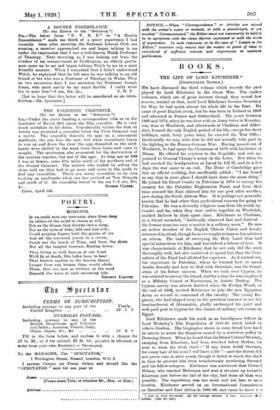BOOKS.
Ws have discussed the third volume which records the part played by Lord Kitchener in the Great War. The earlier volumes, which are of great interest though they reveal few secrets, remind us that, until Lord Kitchener became Secretary for War, he had spent almost his whole life in the East. Be came Of good English stock, but he was born in Ireland in 1850 and educated in France and Switzerland. The years between 1866 and 1874, when he was first with an Army tutor in Kensing- ton, then at Woolwich, and afterwards at Chatham and Alder- shot, formed the only English period of his life, except for short holidays, mail, forty years later, he entered the War Office. Incidentally we may note that he did not actually take part in the fighting in the Franco-German War. Having passed out of Woolwich, he had spent the Christmas of 1870 with his father at Dinan. He offered his services to the Republic, and was ap- pointed to General Chanzy's army On the Loire. But when he had reached the headquarters at Laval he fell ill, and in a few days the war came to an end. The Duke of Cambridge gave him an official scolding, but unofficially added : "I am bound to say that in your place I should have done the same thing." He joined his friend Conder in Palestine in 1874 to survey the country for the Palestine Exploration Fund, and from that time onward the East claimed him for one post after another, save during the South African War. It is perhaps not generally known that he had other than professional reasons for going to Palestine. He was a devoutly religious man from his youth up. Corder and he, when they were cadets together at Woolwich, studied Hebrew in their spare time. Kitchener at Chatham, as a friend recorded, "habitually observed fast and festival-- the former none too easy a matter in a military mess." He was an active member of the English Church Union and keenly interested in ritual, though he never sought to impose his opinions on others. The taak of surveying the Holy Land thus had special attractions for him, and was indeed a labour of love. It was characteristic of Kitchener that he not only did the work thoroughly well, but also centrived to spend less than the Com- mittee of the Fund had allotted for expenses. As it turned out, his experience in Palestine, where he learned how to speak Arabia fluently and how to deal with Orientals, was the found- ation of his future success. When we took over Cyprus, he was ordered to survey the island, and for a time he was employed as a Military Consul at Kastamuni, in Asiatic Turkey. Tho Cyprus survey was almost finished when Sir Evelyn Wood, at the end of 1882, invited Kitchener to join the now Egyptian Army as second in command of the cavalry. The young En- gineer, who had slipped away in the previous summer to see the bombardment of Alexandria, gladly exchanged his quiet and well-paid post in Cyprus for the °hand() of military adventure in Egypt.
Lord Kitchener made his mark as an Intelligence Officer in Lord Wolseley's Nile Expedition of 1884-95 which failed to relieve Gordon. His biographer shows in some detail how hard he strove to avert the disasters caused by a nerveless policy in Downing Street. When he heard that his friend Colonel Stewart, escaping from Khartum, had been wrecked below Berber, he sent to warn the local chief—" If any harm befall Stewart, for every hair of his bead I will have a life "—and the threat did not prove vain in after years, though it failed to reach the chief in time to prevent him from treacherously murdering Stewart and his fellow-refugees. Kitchener was convinced that Colonel Wilson, who reached Metemma and sent a steamer up towards Khartum just before the fall of the city, had done all that was possible. The expedition was too weak and too late to save Gordon. Kitchener served on an International Commission on Zanzibar and East Africa in 1885-86, and came to know t • Life of Lord Riiehenes, By Mt George Arthur. C voL Louauu (52e. Od• net,'
German official at his worst. He was given the command at Suakin in 1886, and two years later he was appointed Adjutant- General of the Egyptian Army. In 1892 he succeeded Sir Francis Grenfell as Sirdar. He had won the confidence of Lord Cromer, and he had the support of Lord Salisbury, who, like Lord Cromer, was no respecter of persons and valued men for their character and ability. The present Lord Salisbury, in an interesting Preface, recalls the close friendship that existed between his father and Lord Kitchener, and says that they had much in common—" the broad conception, the far-seeing eye, the sanity of judgment, the contempt for political sham, the light-hearted iconoclasm, the personal simplicity, the patriotic devotion." The author declares that Lord Salisbury intervened at the critical moment in 1897 when the War Office, having to send a division to the Sudan for the final advance against the Klutlife, thought that Lord Kitchener ought to be superseded by a General of higher rank. Lord Salisbury "intimated to his colleagues in the Cabinet that if any other than Kitchener were to command the Expedition to Khartum they would have to change their Prime Minister." It is curious to find that before the battle of Atbara the Man of Iron, as he was popularly re- garded, showed a momentary hesitation because, while General Catacre urged an immediate attack, General Hunter wanted to wait. He went so far as to ask Lord Cromer for his opinion, and was afterwards reproved by Lord Wolseley for seeming to shift the responsibility which was his alone. It was a passing mood. Kitchener was overwrought by nervous strain on real- izing that the plans at which he had worked for years were about to attain fruition. He never hesitated again. Atbara was a complete success. Omdurman on September 2nd, 1898, saw the final overthrow of the Khalifs. If the tactics employed seem elementary to our practised eyes, they were successful and inexpensive. The Sirdar knew that his enemy scorned Western methods of war, and that the Dervishes' frontal attack in mass must wither away before a steady fire. Not less wonderful than the organization of the expedition was the speeay restoration of order in the Sudan.
The new Governor-General was soon summoned away to South Africa to assist Lord Roberts. Lord Salisbury, it seems, had again insisted on Kitchener's appointment, and again he was justified by the event. The biographer deals very fairly with the old controversy about Paardeberg. He prints a memo- randum in which Kitchener defended his decision to attack Cronje at once, and pointed out that after the action Cronje, having lost all his horses and oxen, was helpless. The plan of attack—from all sides at once—was indeed sound in itself. For lack of an adequate Staff, however, Lord Kitchener could not co-ordinate the movements of the different forces, which under normal conditions would have overwhelmed the Boers in a few hours. But surely the plan of attack should have been within the compass of Staff abilities. The delay that followed the lirst attack gave the Boers elsewhere time to regain their spirits and plan a new campaign. We need only touch on two other questions. Lord Roberts's return home in 1900 as a conqueror produced a false impression not only in the public mind but also on the Government. Lord Kitchener through the two weary years of guerrilla warfare was always hampered by the prevailing assumption that the war was really over and that his forces could be safely reduced. The biographer rightly insists on Lord Kitchener's states- manlike desire to give the Boers the best possible terms so that the war might not leave undying enmity behind it. Had he been free to act, he could have made peace with General Botha in the spring of 1901 and thus saved a whole year of war. All the points which the Government and the High Commissioner refused to concede then, they waived a year later. The soldier, as often happens, was more eager for peace and more far-sighted than the civilians. We may presume that the lesson was not lost on Ministers, and that when Lord Kitchener, as Commander-in- Chief in India, became involved in a controversy with Lord Curzon as Viceroy, he received far more support from Whitehall than would have been given to any ordinary soldier for the reason that in South Africa he had shown himself a statesman as well as a general. We need not revive that old dispute, which is related at great length, from Lord Kitchener's standpoint, by Sir George Arthur. There is much truth in the biographer's plea that Lord Kitchener's reforms alone made it possible for India to contribute many divisions to the Great War in Europe, Palestine, Mesopotamia, East Africa, and elsewhere. On the other hand, the Indian Government had not been made to realize that armed men alone do not constitute an army. The deplorable inadequacy of the Transport and Medical Services on the Tigris in the first two years of the war cost the lives of many British and Indian soldiers, and pointed to very grave defects in the Indian administrative machine. Lord Kitchener, of course, was in no way to blame for this. We mention it only to show that his scheme, as modified by the civilians, did not ensure the full co-operation between the Commander-in-Chief and the Finance Department which was essential to efficiency in war, whether on the Tigris or on the North-West Frontier. Lord Curzon foresaw that, and the event justified him. When Kitchener left India in the autumn of 1909, after seven years' service, he was invited to report on the defence forces of Australia and New Zealand. Few can have foreseen how opportune that visit was, and how valuable the impetus given to military training in the Dominions was to prove less than five years later. When he returned home in 1910, Lord Kitchener earnestly desired the Viceroyalty of India, but Lord Morley refused to appoint him. A friend, referring to the political lull caused by the death of King Edward, said to Lord Kitchener "The King has died at the psychological moment." "Not the psychological moment for me," was the reply, for he had hoped that King Edward might persuade Lord Morley to overcome his aversion from military men. Yetfrom the Imperial point of view we need not regret Lord Morley's stubbornness. For it left Lord Kitchener free to accept the position of Consul- General and virtual ruler in Egypt, which under his wise admin- istration regained domestic peace and prosperity. If Egypt in 1914 had been as discontented as it was in 1910, we should have had far greater difficulties to face at the outset of the war with Turkey. Lord Kitchener's luck was proverbial. It was his country's luck to possess such a wise, firm, and entirely disinterested public servant. Sir George Arthur's fascinating volumes remind us again and again of the incalculable debt that the British Empire owes to Lord Kitchener.



































 Previous page
Previous page